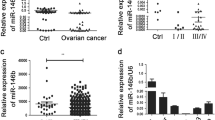Abstract
The Polycomb group protein, enhancer of zeste homolog 2 (EZH2), plays an important role in transcriptional regulation through chromatin remodeling and interactions with other transcription factors to control cell proliferation and embryonic development. Previous study has shown that EZH2 is important for cell cycle regulation and is highly expressed in human ovarian cancer. Loss of EZH2 inhibits growth of ovarian cancer as well as other human carcinomas. In this study, an expression plasmid of EZH2-targeted microRNA-98 was constructed and transfected into human ovarian cancer stem cells (OCSCs). Seventy-two hours after transfection, cell growth was inhibited and arrested at the G0/G1 transition. p21CIPI/WAF1 was up-regulated, while the CDK2/cyclin E complex and c-Myc were down-regulated. Most importantly, expression levels of E2F1, retinoblastoma protein (pRb), and histone deacetylase 1 (HDAC1) in the pRb–E2F signaling pathway had changed. Furthermore, microRNA-98 suppressed the growth of OCSCs xenograft tumors. Our findings suggest that EZH2-specific microRNA-98 can effectively inhibit cell proliferation in vitro and regulate the pRb–E2F pathway in human OCSCs.




Similar content being viewed by others
References
Zhang S, Balch C, Chan MW, Lai HC, Matei D, Schilder JM. Identification and characterization of ovarian cancer-initiating cells from primary human tumors. Cancer Res. 2008;68:4311–20.
Liu T, Cheng W, Lai D, Huang Y, Guo L. Characterization of primary ovarian cancer cells in different culture systems. Oncol Rep. 2010;23:1277–84.
Qin W, Ren Q, Liu T, Huang Y, Wang J. MicroRNA-155 is a novel suppressor of ovarian cancer-initiating cells that targets CLDN1. FEBS Lett. 2014;587:1434–9.
Cheng W, Liu T, Wan X, Gao Y, Wang H. MicroRNA-199a targets cd44 to suppress the tumorigenicity and multidrug resistance of ovarian cancer-initiating cells. FEBS J. 2012;279:2047–59.
Sher F, Rossler R, Brouwer N, Balasubramaniyan V, Boddeke E, Copray S. Differentiation of neural stem cells into oligodendrocytes: involvement of the polycomb group protein ezh2. Stem Cells. 2008;26:2875–83.
Azuara V, Perry P, Sauer S, Spivakov M, Jorgensen HF, John RM, et al. Chromatin signatures of pluripotent cell lines. Nat Cell Biol. 2006;8:532–8.
Rajasekhar VK, Begemann M. Concise review: roles of polycomb group proteins in development and disease: a stem cell perspective. Stem Cells. 2007;25:2498–510.
Saramaki OR, Tammela TL, Martikainen PM, Vessella RL, Visakorpi T. The gene for polycomb group protein enhancer of zeste homolog 2 (EZH2) is amplified in late-stage prostate cancer. Gene Chromosome Cancer. 2006;45:639–45.
Sparmann A, van Lohuizen M. Polycomb silencers control cell fate, development and cancer. Nat Rev Cancer. 2006;6:846–56.
Fujii S, Ochiai A. Enhancer of zeste homolog 2 downregulates e-cadherin by mediating histone H3 methylation in gastric cancer cells. Cancer Sci. 2008;99:738–46.
Bryant RJ, Cross NA, Eaton CL, Hamdy FC, Cunliffe VT. EZH2 promotes proliferation and invasiveness of prostate cancer cells. Prostate. 2007;67:547–56.
Otte AP, Kwaks TH. Gene repression by polycomb group protein complexes: a distinct complex for every occasion? Curr Opin Genet Dev. 2003;13:448–54.
Kuzmichev A, Jenuwein T, Tempst P, Reinberg D. Different EZH2-containing complexes target methylation of histone H1 or nucleosomal histone h3. Mol Cell. 2004;14:183–93.
Kuzmichev A, Margueron R, Vaquero A, Preissner TS, Scher M, Kirmizis A, et al. Composition and histone substrates of Polycomb repressive group complexes change during cellular differentiation. Proc Natl Acad Sci U S A. 2005;102:1859–64.
Dykxhoorn DM, Palliser D, Lieberman J. The silent treatment: siRNAs as small molecule drugs. Gene Ther. 2006;13:541–52.
Dykxhoorn DM, Lieberman J. The silent revolution: RNA interference as basic biology, research tool, and therapeutic. Annu Rev Med. 2005;56:401–23.
Doench JG, Petersen CP, Sharp PA. siRNAs can function as miRNAs. Genes Dev. 2003;17:438–42.
Fedorov Y, King A, Anderson E, Karpilow J, Ilsley D, Marshall W, et al. Different delivery methods—different expression profiles. Nat Methods. 2005;2:241.
Heidel JD, Hu S, Liu XF, Triche TJ, Davis ME. Lack of interferon response in animals to naked siRNAs. Nat Biotechnol. 2004;22:1579–82.
Xu F, Wang H, Zhang X, Liu T, Liu Z. Cell proliferation and invasion ability of human choriocarcinoma cells lessened due to inhibition of sox2 expression by microRNA-145. Exp Ther Med. 2012;5:77–84.
Zhang L, Liu T, Huang Y, Liu J. MicroRNA-182 inhibits the proliferation and invasion of human lung adenocarcinoma cells through its effect on human cortical actin-associated protein. Int J Mol Med. 2011;28:381–8.
Wu S, Huang S, Ding J, Zhao Y, Liang L, Liu T, et al. Multiple microRNAs modulate p21Cip1/Waf1 expression by directly targeting its 3′ untranslated region. Oncogene. 2010;29:2302–8.
Jansson MD, Lund AH. microRNA and cancer. Mol Oncol. 2012;6:590–610.
Richter GH, Plehm S, Fasan A, Rossler S, Unland R, Bennani-Baiti IM, et al. EZH2 is a mediator of EWS/FL1 driven tumor growth and metastasis blocking endothelial and neuro-ectodermal differentiation. Proc Natl Acad Sci U S A. 2009;106:5324–9.
Simon JA, Lange CA. Roles of the EZH2 histone methyltransferase in cancer epigenetics. Mutat Res. 2008;647:21–9.
Bachmann IM, Halvorsen OJ, Collett K, Stefansson IM, Straume O, Haukaas SA, et al. EZH2 expression is associated with high proliferation rate and aggressive tumor subgroups in cutaneous melanoma and cancers of the endometrium, prostate, and breast. J Clin Oncol. 2006;24:268–73.
Acknowledgments
This work was supported by grant from the National Natural Science Foundation of China (No. 81202811) and the Shanghai Municipal Health Bureau Fund (No. 20124320) to Te Liu.
Conflicts of interest
None
Author information
Authors and Affiliations
Corresponding author
Rights and permissions
About this article
Cite this article
Liu, T., Hou, L. & Huang, Y. EZH2-specific microRNA-98 inhibits human ovarian cancer stem cell proliferation via regulating the pRb-E2F pathway. Tumor Biol. 35, 7239–7247 (2014). https://doi.org/10.1007/s13277-014-1950-9
Received:
Accepted:
Published:
Issue Date:
DOI: https://doi.org/10.1007/s13277-014-1950-9




